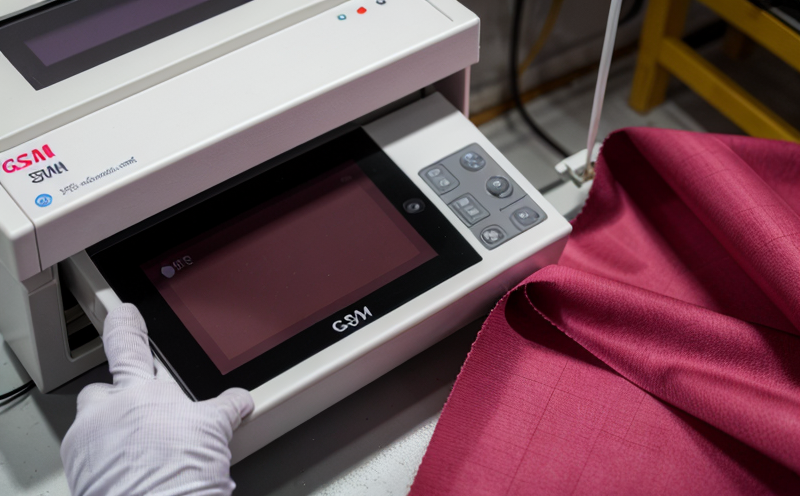BS 2580 Determination of Fabric Density
The British Standard (BS) 2580 is a widely recognized method used to determine the fabric density, which is essential for quality assurance in textile manufacturing. This test measures the number of yarns per inch or centimeter within a given area of fabric. It is particularly important for ensuring that fabrics meet specific design and performance requirements.
Fabric density plays a crucial role in determining the durability, comfort, and aesthetic appeal of textiles. In sectors such as clothing, automotive interiors, and home furnishings, accurate measurement of fabric density can prevent quality issues, reduce waste, and enhance customer satisfaction. The BS 2580 method provides consistent results across different laboratories, which is vital for maintaining uniformity in product quality.
The standard specifies the procedure to be followed when testing fabrics using a micrometer or similar instrument designed specifically for this purpose. The test involves cutting samples from the fabric according to specified dimensions and then measuring the number of yarns within these areas at various points across the sample. This process ensures that all measurements are taken under controlled conditions, minimizing variability.
Accurate determination of fabric density is critical for several reasons:
- Quality Control: Ensures that fabrics meet specified design and performance criteria.
- Consistency: Provides consistent results across different batches or production runs, which helps maintain uniformity in product quality.
- Cost Efficiency: Helps identify potential issues early on, preventing costly rejections downstream in the supply chain.
The BS 2580 method is widely used by manufacturers, suppliers, and buyers across various industries. By adhering to this standard, companies can ensure that their products are consistent with industry expectations and meet customer demands for high-quality textiles.
In summary, the BS 2580 Determination of Fabric Density test provides a standardized approach for measuring fabric density, which is essential for ensuring product quality in textile manufacturing. Its importance lies not only in meeting regulatory requirements but also in helping businesses maintain consistent performance and customer satisfaction.
Why Choose This Test
Selecting the BS 2580 Determination of Fabric Density test offers several advantages for textile manufacturers, quality managers, and compliance officers:
- Standardization: The method ensures that all measurements are taken under controlled conditions, providing consistent results across different laboratories.
- Regulatory Compliance: Adhering to this standard helps businesses meet industry-specific regulations and standards related to fabric density.
- Enhanced Quality Control: By regularly testing fabrics using the BS 2580 method, manufacturers can identify potential issues early on and take corrective actions promptly.
- Better Product Performance: Accurate measurement of fabric density contributes to improved product performance, including durability, comfort, and aesthetic appeal.
- Customer Satisfaction: Consistent quality in products leads to higher customer satisfaction, which is crucial for maintaining a strong market presence.
In addition to these benefits, the BS 2580 test also supports sustainable practices by promoting efficient use of raw materials and reducing waste. This aligns with broader corporate sustainability goals while enhancing brand reputation.
Overall, choosing this test demonstrates a commitment to quality and compliance, which can lead to increased market share and long-term success in the textile industry.
Environmental and Sustainability Contributions
The BS 2580 Determination of Fabric Density test plays an important role in supporting environmental sustainability within the textile sector. By ensuring that fabrics meet specific design and performance requirements, this standard helps reduce waste by enabling early identification of potential issues during production.
Accurate measurement of fabric density contributes to more efficient use of raw materials, which can lead to significant reductions in energy consumption and greenhouse gas emissions associated with textile manufacturing. Additionally, consistent quality ensures that products are durable and long-lasting, reducing the need for frequent replacements and disposal of defective items.
Moreover, adherence to this standard promotes transparency throughout the supply chain, allowing stakeholders at all levels to track progress toward sustainability goals. This fosters collaboration among industry players and encourages innovation in environmentally friendly practices.
Incorporating sustainable practices into textile manufacturing not only benefits the environment but also enhances brand reputation and consumer trust. Companies that prioritize environmental responsibility are more likely to attract eco-conscious consumers who value sustainability above price when making purchasing decisions.
Competitive Advantage and Market Impact
- Consistency Across Laboratories: The BS 2580 method ensures that all measurements are taken under controlled conditions, providing consistent results across different laboratories. This consistency is vital for maintaining uniformity in product quality.
- Regulatory Compliance: Adhering to this standard helps businesses meet industry-specific regulations and standards related to fabric density.
- Better Product Performance: Accurate measurement of fabric density contributes to improved product performance, including durability, comfort, and aesthetic appeal.
- Customer Satisfaction: Consistent quality in products leads to higher customer satisfaction, which is crucial for maintaining a strong market presence.
The BS 2580 Determination of Fabric Density test provides a standardized approach for measuring fabric density, ensuring that all results are accurate and reliable. This standardization helps manufacturers maintain consistent performance across different batches or production runs, which is essential for meeting customer expectations and maintaining competitive advantage.
By adhering to this standard, businesses can demonstrate their commitment to quality and compliance, which can lead to increased market share and long-term success in the textile industry. The test also supports sustainable practices by promoting efficient use of raw materials and reducing waste.





